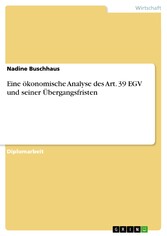Suchen und Finden
Eine ökonomische Analyse des Art. 39 EGV und seiner Übergangsfristen
Diplomarbeit aus dem Jahr 2008 im Fachbereich VWL - Arbeitsmarktökonomik, Note: 2,3, Eberhard-Karls-Universität Tübingen, Sprache: Deutsch, Abstract: The aim of the thesis was to find out whether immigration from the Central and Eastern European countries negatively effects the wage and employment level in the present EU and - if that is the case - whether the implementation of transitional periods for the free movement of workers, like in Germany, can prevent these negative immigration effects. To better predict the impact of unrestricted and restricted labor migration,the paper analysed several models that took into consideration the skill composition of the migration workforce, labor market inflexibility in receiving countries, and the heterogeneity of different regions. Considering these variables, one has to draw the following conclusions: From an academic perspective, the impact of migration is still controversial. Some theoretical and empirical studies find very small wage and employment effects of migration, others show considerable large impacts. Also for Germany it is unsure if there is really cause for concern. However, recent studies show that migration barriers, like in Germany, are often insufficient to prevent negative wage and employment effects. Other policy options have to be taken into account.
Alle Preise verstehen sich inklusive der gesetzlichen MwSt.











